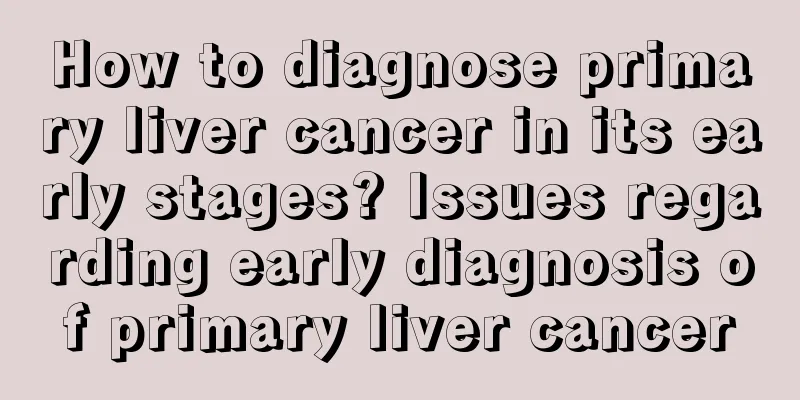How to diagnose primary liver cancer in its early stages? Issues regarding early diagnosis of primary liver cancer

|
Because the liver is hidden deep in the upper abdomen and is protected by the ribs, it is difficult to detect swelling in the early stages. In addition, the liver has a strong compensatory capacity and is often asymptomatic in the early stages, which also makes it difficult to diagnose liver cancer in the early stages. However, once symptoms of liver cancer appear, it is often in the late stages, when treatment is ineffective. Therefore, early diagnosis of liver cancer and finding early cases in the asymptomatic population are of practical significance for controlling the mortality rate of liver cancer. The main way to diagnose liver cancer in the early stage is to conduct a liver cancer screening. In the past, early liver cancer could only be found occasionally during upper abdominal surgery. Since the 1970s, my country has advocated liver cancer screening and found many early liver cancer patients. According to data, among the cases found in the liver cancer screening, 83.6% were clinical liver cancer (referring to liver cancer without symptoms and signs); 53% were "small liver cancer" (liver cancer with a maximum diameter of less than 5 cm); 58% were single cancer nodules; 58.6% had intact capsules around the cancer; and 97.7% had no portal vein or hepatic vein cancer thrombus. The cases diagnosed clinically after the onset of the above conditions were 0%, 13.1%, 23%, 38.4% and 42.7% respectively. The difference between the two is very significant, which fully demonstrates that liver cancer screening can indeed detect liver cancer cases at an early stage. The most direct effect of liver cancer screening is to increase the chances of surgical resection for patients. Since most of the cases detected by liver cancer screening are in the early stage and the cancer volume is small, local resection can often be performed. Since the amount of liver removed is small, even patients with a certain degree of liver cirrhosis can tolerate it more easily. Early liver cancer often has a relatively complete capsule and the chance of intrahepatic dissemination is small. Therefore, the chances of surgical resection for cases found by the screening are significantly increased. As the number of cases that can be surgically resected increases, the overall prognosis of liver cancer patients has been significantly improved. According to data from the Liver Cancer Research Institute of Shanghai Medical University, the 5-year survival rate after radical surgical resection of small liver cancers with a diameter of less than 5 cm is 72.9%, and the 5-year survival rate after surgical resection of liver cancers less than 2 cm is 86.4%. The key to achieving satisfactory results of surgical treatment is early diagnosis. Since there are more cases that can be resected, the 5-year survival rate of cases found by the screening is significantly higher than that of cases diagnosed clinically after the onset of the disease, which are 28.6% and 5.6% respectively. The 5-year survival rate of liver cancer patients found by the screening and radically resected is as high as 66.7%. The above data prove that the survey is of great significance for the early diagnosis and treatment of liver cancer. Alpha-fetoprotein (AFp) testing and B-ultrasound examination are the main means of early detection and early diagnosis of liver cancer. If AF7 combined with B-ultrasound detection is used to screen for liver cancer, if both are positive, that is, AFp>400 micrograms per liter, and B-ultrasound finds clear substantial space-occupying lesions in the liver area, it can basically be confirmed as liver cancer. If AFp is positive and B-ultrasound does not find space-occupying lesions, or B-ultrasound shows substantial space-occupying lesions, CT or MRI examination should be performed. |
Recommend
What to do if body tissue calcification
Many people do not know what body tissue calcific...
What kind of water can whiten and lighten spots
As women, we all hope that our skin is healthy an...
What are the disadvantages of massage
With the progress of society and the improvement ...
A health food comparable to ginseng: ginseng loach in water
We know that ginseng is one of the most popular s...
What are the precautions for periodontitis?
When I got up early in the morning to brush my te...
How to diagnose early rheumatoid arthritis?
Rheumatic disease is a type of joint disease that...
What is the best way to remove moles
When removing a mole, you must first consider its...
Factors that may cause melanocytoma
Anyone who has watched the movie "If You Are...
The stomachache goes away if I squat
Sometimes we experience stomach pain, which is a ...
What foods can't be eaten by patients with nasopharyngeal cancer
What can't nasopharyngeal cancer patients eat...
What is the reason for body dandruff
Most people are prone to dandruff in winter. This...
What is the fastest treatment for stiff neck
I believe many people have experienced stiff neck...
What are the treatments for severe hepatitis?
With the increase in major industrial production ...
How to reduce redness on the face
Everyone loves beauty, and this is even more true...
Sequelae of femoral head necrosis replacement
Nowadays, most people do not have time for physic...









